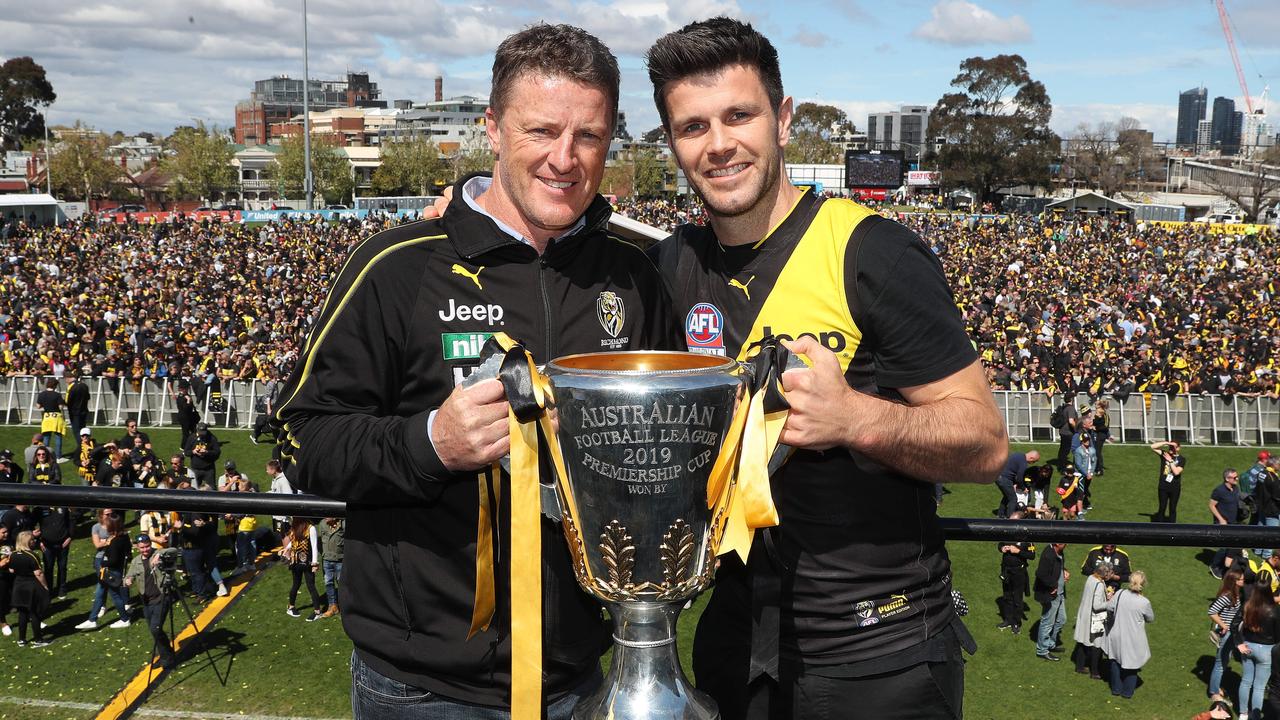NFL opens the door to looking to alternative medication - such as marijuana - to deal with pain management of American footballers
AFL footballers will be expecting their union to be keeping a close eye on their American counterparts as the NFL opens the door to using alternative medicine - such as marijuana - for its players’ health
Michelangelo Rucci
Don't miss out on the headlines from Michelangelo Rucci. Followed categories will be added to My News.
- Sign-up for the Rucci Roast
- Was the Bryce Gibbs deal worth it?
- Player’s pain up in smoke
- Picture Gallery: AFL Round 10
- Bonus could be incentive
Former 36ers NBL basketball coach Ken Cole - the man the Sixers board sacked for smoking marijuana on a road trip in 1986 - would again say he was before his time.
And the AFL Players’ Association - that seems to take every leaf from its American equivalents - will have so many of its members eager to embrace the latest step in dealing with player welfare from the NFL (American football).
The NFL last week - in a joint statement with its players’ union - opened the door for marijuana to become part of the pain treatment of players. While the “weed” was not specifically mentioned it was implied as the NFL prepares to develop “uniform standards for club practices and policies regarding pain management and the use of prescription medication by NFL players as well as conduct research concerning pain management and alternative therapies.”
There will be quite a crew of AFL players, particularly those feeling discontent with the league’s illicit drug policy, who will be eager to download copies of the NFL reports ... and send AFLPA boss Paul Marsh to AFL House to open the review.
And the turn to using medical marijuana in the NFL locker room marks a moment of personal vindication for banned Dallas Cowboys player David Irving.
Suspended indefinitely and expecting his contract with one of America’s biggest sporting franchises to be ripped up, Irving on March 1 took to social media with an Instagram video in which he smoked a joint ... and quit the NFL.
Irving’s story will resonate with some AFL players, in particular those accused of using the “mental health” screen to mask their social drug use.
Irving insists he needed marijuana to survive - on and off the field.


“It was the only way for me to get by,” Irving said of his marijuana use that began while in high school where his academic results were strong and his civic record was clean.
“I’m a real human being. I have real problems. I come from poverty. I have family issues (sole custody of his daughter).
“(Marijuana) helped me outside of football.
“The only way I could deal with football was with my medication - and they (the NFL) took it away from me,” added Irving who was first banned for four games in 2017 for breaching the toughest drug code in American professional sport.
“They didn’t kick me off (the Cowboys’ roster) - I quit, I chose,” Irving said. “Because it is that important to me and nobody’s going to tell me I have to take opioids over smoking marijuana.”
Irving is not alone. NFL veteran Chris Long, who recently retired after an 11-season career, declared on American television last week his long-standing use of marijuana - and made a mockery of the NFL’s drug testing.
“I certainly enjoyed my fair share on a regular basis throughout my career,” Long said. “So, you know, and I was never afraid to say that, and I’m able to say it more explicitly now: If not for that, I’m not as capable of coping with the stressors of day-to-day NFL life.”

NFL players are tested for illicit drugs once in the off-season between April and August.
“Testing players once a year for ‘street drugs’, which is a terrible classification for marijuana, is kind of silly because, you know, players know when the test is,” Long said. “We can stop. And in that month or two that you stop, you’re going to reach for the sleeping pills, you’re going to reach for the pain killers, you’re going to reach for the bottle a little bit more.
“On the weekend you’re going to have a few more drinks, and a few turns into a few too many. . . . It’s just not the same. If you’re serious about players not smoking, you’d be testing more often. I hope they go the opposite direction and kind of realise how arbitrary doing that one test a year is.”
The AFL might find that next study tour to the US has more AFLPA representatives eager to join the entourage to New York City.
michelangelo.rucci@news.com.au


